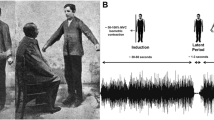Abstract.
Are the words reflex and voluntary useful scientific concepts, or are they prescientific terms that should be discarded? Physiologists use these words routinely in their publications, in laboratory experiments and, indeed, like most lay people, in their daily lives. The tacit assumption is that we all know, more or less, what they mean. However, the issue has a rich history of philosophical and scientific debate; and, as this article demonstrates, present-day researchers still cannot reach a consensus on the meaning of the words and on whether it is possible to draw a scientific distinction between them. The five authors present five quite different analyses. In broad terms, they split into two camps: those who equate voluntary behaviours with consciousness and suppressibility and those who view all behaviours as sensorimotor interactions, the complexity of which determines whether they are reflexive or voluntary. According to the first view, most movements of daily life are neither purely reflex nor purely voluntary. They fall into the middle ground of automatic motor programs. According to the second view, as neuroscience advances the class of reflex behaviours will grow and the class of voluntary behaviours will shrink.
Similar content being viewed by others
Author information
Authors and Affiliations
Additional information
Electronic Publication
Rights and permissions
About this article
Cite this article
Prochazka, A., Clarac, F., Loeb, G. et al. What do reflex and voluntary mean? Modern views on an ancient debate. Exp Brain Res 130, 417–432 (2000). https://doi.org/10.1007/s002219900250
Received:
Accepted:
Issue Date:
DOI: https://doi.org/10.1007/s002219900250




